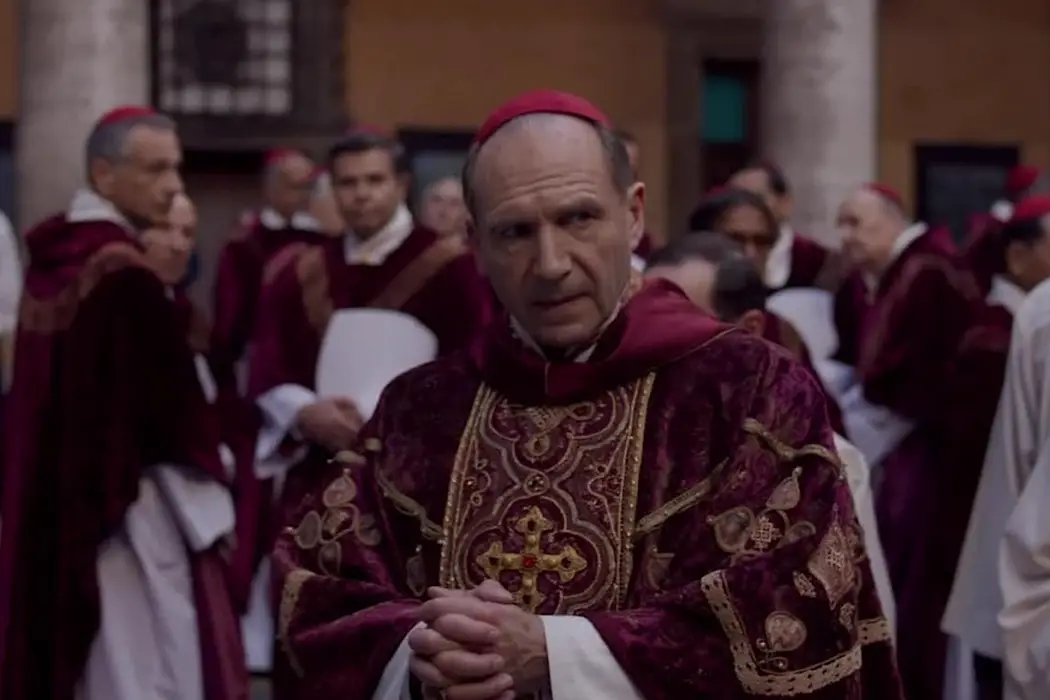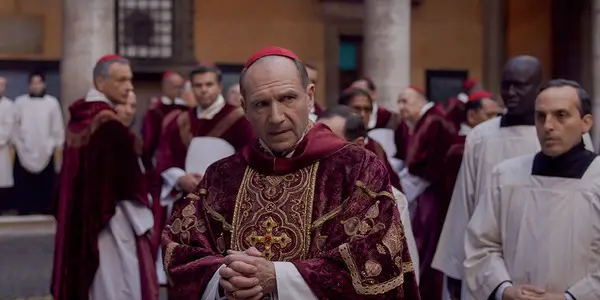TIFF 2024: Conclave and We Live in Time

Wilson is a cinema enthusiast based out of Toronto, Canada.…
Being at a fall film festival like TIFF, it’s hard not to look at certain films from the perspective of a potential awards run. And with both Conclave and We Live in Time, that potential certainly exists (particularly for the former). Reassuringly, both films are also just prime examples of solid filmmaking, that will likely be successful regardless of what accolades they end up garnering.
Conclave

Whether or not palpal conclaves are actually this exciting in real life is likely questionable, but Conclave established a truly invigorating (and certainly fictionalized) election story nonetheless. Edward Berger continues to demonstrate his command as a filmmaker, crafting a thrilling and expansive narrative that leaps beyond the story’s limited locale. Ralph Fiennes, not surprisingly, gives a stunning performance and will likely be back on the awards circuit in the coming months.
Set in the wake of the pope’s death, the Dean of Cardinals, Cardinal Lawrence (Fiennes) is tasked with running the next conclave. Potential candidates include cardinals played by Stanley Tucci, John Lithgow, Lucian Msamati and Sergio Castellitto, whose intentions prove to be far from pure as the story unravels. Isabella Rossellini‘s presence as Sister Agnes serves as one of the few female voices present during the conclave itself.
Using Volker Bertelmann’s piercing score, the film seamlessly jumps from one plot twist to the next. The experience is a riveting one, anchored by Fiennes’ searing performance that carries almost every frame of the film. His moral anguish is for the most part subtle and concealed, and never feels overstated. It’s a masterful performance that will likely stand out as one of Fiennes’ greatest in recent memory.
While the film does an excellent job at conveying an almost claustrophobic setting when its character are sequestered during the election process, it also creates a story that feels boundless in nature. Berger masterfully expands the narrative by setting the film on the backdrop of a suspenseful political thriller. The story feels larger than the events within its boarded quarters, generating discourse on electoral processes in general. Instances of corruption and moral impairments aren’t necessarily new ideas, but they’re presented in such a captivating fashion.
The film does falter in perhaps not presenting some of its most intriguing plot twists until the very end, which hinders the creation of a more socially conscious story. Alas, Conclave leans more heavily on its commercial properties, which is perfectly fine. It still manages to leave enough food for thought, while being riveting in its execution.
We Live in Time

It should come as no surprise that the combination of Andrew Garfield and Florence Pugh in a film will result in something fantastic, and John Crowley’s We Live in Time is just that; a fantastic film. This is one of the most touching romances in recent memory, which is crowd pleasing in many respects, but never panders to any generic tear jerker tendencies. And despite feeling conventional at times, the beauty of its execution elevates the film to heights that will make you both laugh and cry.
Piecing together the story in a non-linear fashion, the film essentially jumps between events in Tobias (Garfield) and Almut’s (Pugh) relationship. We see everything from their most intimate and monumental moments, to some of the simpler memories that are still paramount to defining their time together. The chemistry between Garfield and Pugh is simply undeniable, and a prime reason why the film works as well as it does. Garfield, in particular, is subtle, yet also efficiently earnest in his performance. He has a tendency to undersell Tobias’ turbulent emotional state, but everything he does is endearingly heartfelt, nonetheless.
And for a film with such a simplistic premise, We Live in Time feels rather accomplished in the way it conveys genuine emotion so effortlessly. Each emotional beat doesn’t feel contrived at all, and the non-linear approach to storytelling purposefully confounds audience expectations, which is crucial to experiencing each moment with a blank canvas. As the film revisits crucial moments shared between Tobias and Almut, the narrative intentions of each moment are never clearly stated right at the outset. Whether each moment is sad, happy or somewhere in between, remains a mystery until it isn’t, which mirrors the unexpected nature of life itself. Crowley’s pacing is deliberately messy at times, but somehow still manages to weave everything together seamlessly.
We Live in Time presents itself as a straight forward romantic comedy, but Crowley has elevated the film beyond the bounds of simple genre filmmaking. The film is a beautiful allegory on how finite our time in this world truly is, and a reminder that how we define it is often reflective of how others remember it. As romantic comedies seem to be having a bit of a second coming at the moment, We Live in Time will hopefully stand out amongst the crowd, and be recognized for much more than its purported commercial instincts.
Does content like this matter to you?
Become a Member and support film journalism. Unlock access to all of Film Inquiry`s great articles. Join a community of like-minded readers who are passionate about cinema - get access to our private members Network, give back to independent filmmakers, and more.
Wilson is a cinema enthusiast based out of Toronto, Canada. He escapes from his day job by writing random thoughts about cinema on the internet. Although he has a longstanding penchant for Hong Kong cinema, he considers himself to be an advocate for Asian cinema in general. He has been attending the Toronto International Film Festival every year since 2005, and more of his work can be found on his website: www.wilson-kwong.com.












